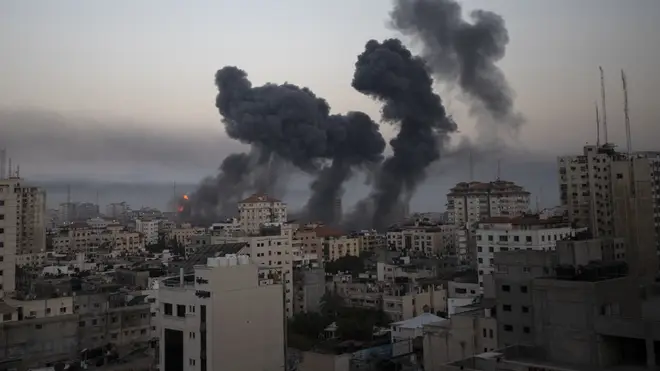
Ali Miraj 12pm - 3pm
12 May 2021, 13:44

Israel has pounded Gaza with air strikes, as Hamas and militant groups responded with rocket attacks.
Rockets have streamed out of Gaza as Israel pounded the territory with air strikes in the most severe outbreak of violence in the Middle East since the 50-day war in 2014.
Gaza’s Hamas rulers and other militant groups have fired hundreds of rockets that have at times overwhelmed Israel’s missile defences, causing explosions and air raid sirens to echo across Tel Aviv and other cities.
Israeli air strikes have levelled two apartment towers in the Gaza Strip, where two million Palestinians have lived under a crippling Israeli-Egyptian blockade since Hamas took power in 2007.
Warning shots have allowed civilians to evacuate the buildings, but the material losses will be immense.
Israel faced heavy criticism over this tactic during the 2014 war.
Just after daybreak on Wednesday, Israel unleashed dozens of air strikes in the course of a few minutes, targeting police and security installations.
The Hamas-run interior ministry said air strikes destroyed the central police headquarters in Gaza City, a compound comprising several buildings.
The death toll in Gaza rose to 48 Palestinians, including 14 children and three women, according to the Health Ministry.

Nearly 300 people have been wounded, including 86 children and 39 women.
Six Israelis, including three women and a child, were killed by rocket fire on Tuesday and early on Wednesday, and dozens of people were injured.
An Associated Press journalist at a hospital in Gaza City saw five dead and seven wounded, including women, from an Israeli air strike that hit a car in the city.
Meanwhile, Gaza militants fired an anti-tank missile across the border, killing an Israeli and wounding two others, who were evacuated under fire, according to Eli Bein, head of the Magen David Adom emergency service.
It was not immediately clear if they were soldiers or civilians.
The Israeli military said militants have fired more than 1,050 rockets since the conflict began, with 200 of them falling short and landing inside Gaza.

The military said it also shot down a drone that entered Israel from Gaza.
Military spokesman Lt Col Jonathan Conricus said two infantry brigades had been sent to the area, indicating preparations for a possible ground invasion.
Samah Haboub, a mother of four in Gaza, said she was thrown across her bedroom in a “moment of horror” by an air strike on an apartment tower next door.
She and her children, aged three to 14, ran down the stairway of their apartment block along with other residents, many of them screaming and crying.
“There is almost no safe place in Gaza,” she said.
The destruction of apartment towers in Gaza was among several tactics used during the 2014 war that are now the subject of an investigation by the International Criminal Court (ICC) into possible war crimes.

Israel is not a member of the court and has rejected the probe.
In a brief statement, ICC prosecutor Fatou Bensouda said she had noted “with great concern” the escalation of violence in the region and “the possible commission of crimes under the Rome Statute” that established the court.
Lt Col Conricus said Israeli forces have strict rules of engagement and follow international laws on armed conflict.
“We are definitely very mindful of civilian casualties in Gaza and we want to minimise them,” he said. “That’s the priority.”
The latest eruption of violence began a month ago in Jerusalem, where heavy-handed police tactics during the Muslim holy month of Ramadan and the threatened eviction of dozens of Palestinian families by Jewish settlers ignited protests and clashes with police.
A focal point was the Al-Aqsa Mosque compound, a holy site sacred to Jews and Muslims.
Israel and Hamas have fought three wars since the Islamic militant group seized power in Gaza from rival Palestinian forces in 2007.

The conflicts ended after regional and international powers convinced both sides to accept an informal truce.
While the violence has been widely condemned, there is no sign that either side is willing to back down.
Prime Minister Benjamin Netanyahu has vowed to expand the offensive, saying “this will take time”.
The unrest in Jerusalem has spread across Israel itself, with an outbreak of communal violence in mixed Jewish-Arab communities, as Hamas has called for a full-scale Palestinian intifada, or uprising.
The last such uprising also began with violence at the Al-Aqsa Mosque, in 2000, and lasted more than five years.
In the Israeli city of Lod, a 52-year-old man and his 16-year-old daughter were killed early on Wednesday when a rocket landed in the courtyard of their one-storey home.
Their car parked outside was wrecked and the interior of the house was filled by debris.

The deceased were reportedly Arab citizens of Israel.
Lod also saw heavy clashes after thousands of mourners joined a funeral for an Arab man who was killed the previous night.
The crowd fought with police and set a synagogue and some 30 vehicles on fire, Israeli media reported.
“An intifada erupted in Lod, you have to bring in the army,” the city’s mayor Yair Revivo said.
Authorities have declared a state of emergency and ordered the redeployment of paramilitary border police companies from the occupied West Bank as reinforcements.
In neighbouring Ramle, ultra-nationalist Jewish demonstrators were filmed attacking cars belonging to Arabs.
In the northern port town of Acre, protesters torched a Jewish-owned restaurant and hotel.